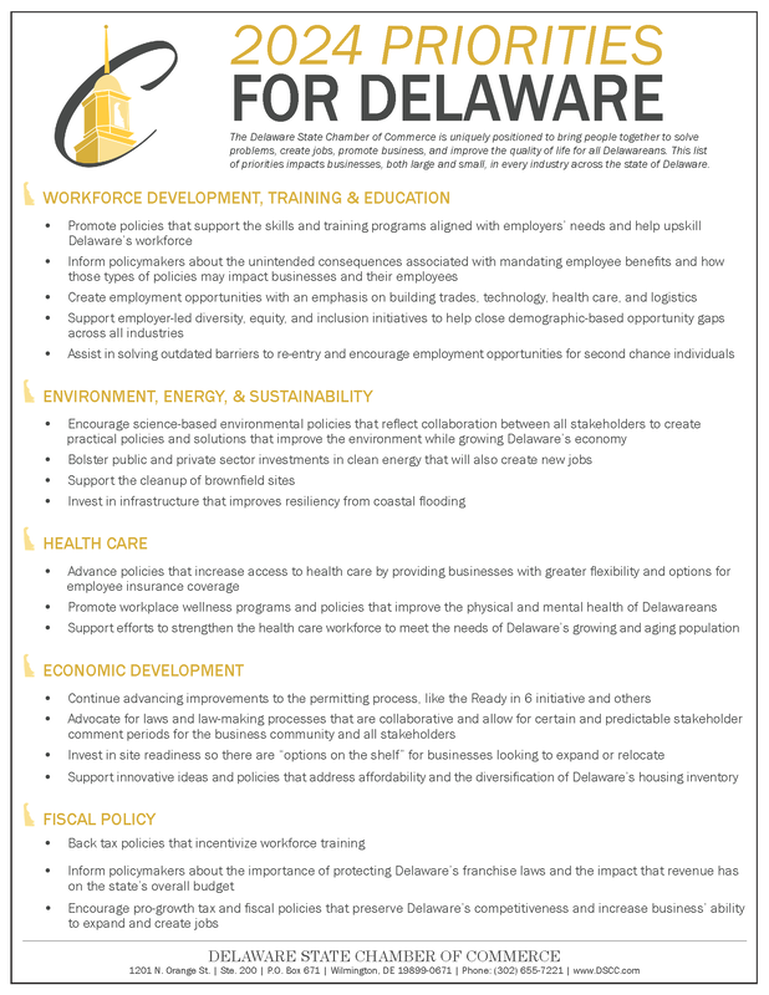 By Tyler Micik Today wraps up the last day of session for the General Assembly before Joint Finance Committee (JFC) hearings begin next week. The General Assembly will return to session on Tuesday, March 5, which is the date of the Governor’s State of the State address. The Governor delivered his FY25 recommended budget address today in Dover. You can view a copy of the presentation here. The Joint Finance Committee will hold hearings throughout February to discuss the Governor’s recommended operating budget. The proposed $6 billion operating budget includes $66 million in grants-in-aid, $943 million for bond and capital improvements, and $91 million for the one-time supplemental budget. The Governor’s recommended budget also includes $52 million towards economic development. This investment supports the site readiness fund and Ready in 6-like programs, among others – which is a top priority of the State Chamber. Since 2017, investments in economic development have helped add 32,100 jobs to Delaware's economy – which is the best job growth the state has seen in the past twenty years. Lastly, one particular area the Governor emphasized is Delaware's rising health care costs. The budget calls for nearly $2 billion dollars to be spent on Medicaid and insurance plans for state employees and retirees. Which is a $200 million dollar increase from FY24 and accounts for nearly 40% of operating budget growth. Unless this is addressed health care costs will continue to crowd out investments in other areas like economic development, affordable housing, and childcare among others.
0 Comments
By Tyler Micik
In came the snow and out went the General Assembly! This week was a relatively quiet week in Dover. Session was cancelled on Tuesday due to the weather and the General Assembly planned on holding a joint session today due to the Governor’s State of the State Address, which was postponed this morning. A new date will be announced soon. Although this week was short, things are sure to pick up soon. There are several bills, which the State Chamber is following, that were introduced last year and are awaiting consideration by the General Assembly. Some of those bills include HB248, HB249, and HB246. A great way to stay up to date on the bills we’re engaged on, which may impact your business and employees is to join one of our policy committees. You can learn more about them here. Our committees give us critical feedback and help guide our positions on policy issues. To learn more or participate, please contact me at [email protected].  By Tyler Micik The 152nd Delaware General Assembly gaveled into the second and final leg of session this week. As a reminder, any bills that were introduced last year and were not defeated or enacted remain active and carry over to this year. Overall, it was a pretty light week as far as acted-upon legislation goes – only a small number of bills (none of which the State Chamber is following or engaged on) were heard in committee and placed on the full agenda for a vote in both Chambers. Additionally, the Senate did not gavel into session on Wednesday. Much like the first week of school, this week is a time for legislators, lobbyists, and others to catch up after the long break and welcome new faces. One of those new faces is Representative Valerie Jones Giltner who was sworn into office on Tuesday. Rep. Giltner replaces Rep. Briggs King, who resigned in November, and will represent Delaware’s 37th House District. The State Chamber looks forward to working with her and all the members of the General Assembly this year in support of our 2024 policy priorities. One issue the State Chamber has its eyes on and will be a topic of conversation in the coming weeks is HB249, known as the DNREC Permit and Fee Increase Bill. The current version was introduced on June 28th and has been assigned to the House Natural Resources and Energy Committee. We expect a substitute bill to be introduced, although it’s unclear what it will look like. As currently written, HB249 proposes 155 permit/fee changes. DNREC is proposing these changes because 92% of the fees have not been adjusted since 1991. The proposed adjustments aim to contribute to funding investments in technology, salaries, and other aspects for the Department. You can view the bill here and a copy of the fee proposal chart here. Please look at both and let me know if you have any thoughts/feedback. We want to hear from you! And if you’re interested in staying up to date on environmental policy, consider joining our Environmental Committee.  By Tyler Micik It's a new year and as the sound of holiday bells subsides, the ringing of bells within Legislative Hall begin again, signaling the start of the second leg of the 152nd Delaware General Assembly. The State Chamber looks forward to working with members of the Delaware General Assembly to achieve our 2024 policy priorities. Our policy priorities are a coordinated list of feedback from our members that includes items we’ve identified as critical because they impact not just our members but the business community at large—regardless of size and industry. Please keep in mind this list is not exhaustive, and it’s designed to be a living document that’s ever-changing to meet the needs of the business community. I’d like to take this opportunity to highlight a couple of topics mentioned in this list. FRANCHISE LAWS Unlike the old saying “Don’t shoot the golden goose,” some members of the General Assembly are proposing legislation that would shoot Delaware’s “golden goose.” Incorporation fees and unclaimed property revenues make up almost half of Delaware’s net general fund revenues. Delaware is internationally recognized as an incorporation destination due to its business-friendly tax laws and Court of Chancery. Corporations registered in Delaware don’t pay corporate income tax and corporate lawsuits are settled by the Court of Chancery—a non-jury trial court with a long history dating back to 1792, comprised of judges specializing in corporate law. For these reasons, companies choose to call Delaware their corporate home despite intriguing offers to go elsewhere, and other states’ efforts to try and duplicate Delaware’s laws. The introduction or passage of any policy directed at undermining these laws will cause corporations to leave, other states to reap the rewards, and Delawareans will be asked to make up for lost revenues through other means like a sales tax, which Delaware—along with only four other states—does not have. PERMITTING Delaware has made significant improvements to its permitting processes, and we thank the Governor and the General Assembly for doing so, but more work must be done. Many businesses are good stewards of the environment and the communities they serve. The perception by some to the contrary, in most cases, is inaccurate and benefits no one. We hope that policymakers will support laws and law-making processes that are collaborative and allow for certain and predictable comment periods for the business community and all stakeholders so that real progress can be achieved. We can’t accomplish anything, especially the State’s clean energy goals, if project timelines are unclear and the obligations placed on businesses are overburdensome. The decisions made this year by those in the General Assembly and by Delaware voters in the fall will have lasting impacts on Delawareans and Delaware’s reputation as a business-friendly state. As the state’s largest business advocacy organization, the Delaware State Chamber of Commerce is uniquely positioned to bring parties together to solve problems, create jobs, promote business, and improve the quality of life for all Delawareans. In that spirit, we look forward to continuing to advocate for our members in 2024. |
Archives
July 2024
Categories
All
|
|
Copyright Delaware State Chamber of Commerce, Inc.
All Rights Reserved. PO Box 671 | Wilmington DE 19899 (302) 655-7221 | [email protected] | sitemap |
|


 RSS Feed
RSS Feed